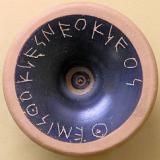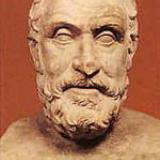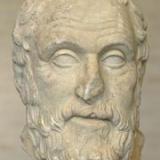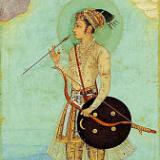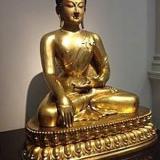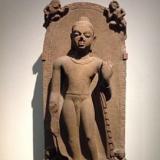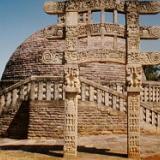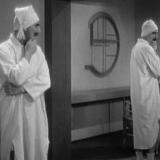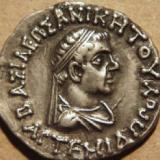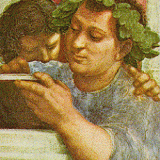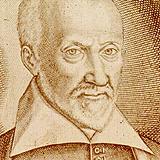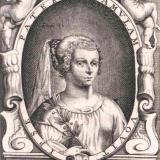Skepticism
Posted on
In this episode, Peter Adamson discusses the sophists, teachers of rhetoric in ancient Athens, looking especially at the contributions of Protagoras and Gorgias.
Posted on
Peter turns to the final major Hellenistic school, the Skeptics, beginning with Pyrrho and the question of how ancient skepticism compares to modern skepticism.
Posted on
Under Arcesilaus and Carneades, Plato’s Academy took a skeptical turn, casting doubt on the possibility of knowledge. But was their skepticism skeptical enough?
Posted on
Cicero’s philosophical works are invaluable records of Hellenistic thought. But what kind of philosopher was Cicero himself?
Posted on
Peter talks to Raphael Woolf about the method and philosophical allegiance of Cicero, focusing on the work On Ends (De Finibus).
Posted on
Sextus Empiricus, the last great ancient skeptic, expounds a radical branch of the tradition called Pyrrhonism. Peter raises some doubts about how to interpret him.
Posted on
Al-Ghazālī’s search for truth leads him to philosophy, Ash'arite theology, and ultimately the mystical tradition of Ṣūfism.
Posted on
Ideas spread to Mughal India from Iran, and prince Dārā Shikūh seeks to unite the wisdom of the Upanishads with the Koran.
Posted on
Skeptical tendences in Indian thought and responses to skepticism from the Mīmāṃsā and Vedānta schools.
Posted on
Nyāya philosophers explain how perception can bring us knowledge.
Posted on
An interview with Susan Brower-Toland covering Ockham's views on cognition, consciousness, and memory.
Posted on
The Cārvāka or Lokāyata tradition rejects the efficacy of ritual and belief in the afterlife, and restricts knowledge to the realm of sense-perception.
Posted on
Nāgārjuna founds the Mādhyamaka (“middle way”) Buddhist tradition by “relinquishing all views” and arguing that everything is “empty.”
Posted on
Nāgārjuna applies his emptiness theory to motion, change, and cognition.
Posted on
Nāgārjuna’s four-fold argument scheme, the tetralemma (catuṣkoṭi).
Posted on
A discussion with Jan Westerhoff, an expert on the great Buddhist thinker Nāgārjuna, dealing with the notion of emptiness, the tetralemma, and Nāgārjuna's reception in India and Tibet.
Posted on
The debate between Nicholas of Autrecourt and John Buridan on whether it is possible to achieve certain knowledge.
Posted on
The medievals were too firm in their beliefs to entertain skeptical worries, right? Don't be so sure, as Peter learns from Dominik Perler.
Posted on
Did Indian ideas play a role in shaping ancient Greek philosophy?
Posted on
The rediscovery of Epicurus, Lucretius, and Sextus Empiricus spreads challenging ideas about chance, atomism, and skepticism.
Posted on
Was Heinrich Cornelius Agrippa a dark magician, a pious skeptic, or both?
Posted on
An interview on the nature of religious tolerance, and the forms it took during the Reformation and in the thought of early modern thinkers like Locke and Leibniz.
Maria Rosa Antognazza is Professor of Philosophy at King's College London.
Posted on
The sources and scope of the skepticism of Montaigne, Charron (pictured), and Sanches.
Posted on
No doubt that we're in good hands with interview guest Henrik Lagerlund, who brings his expertise in the history of skepticism to bear on the French Renaissance. Including a look ahead to Descartes!
Posted on
Marie le Jars de Gourney, the “adoptive daughter” of Montaigne, lays claim to his legacy and argues for the equality of the sexes.
Posted on
How should we approach Shakespeare’s plays as philosophical texts? We take as examples skepticism and politics in Othello, King Lear, and Julius Caesar.
Posted on
Changing ideas about eyesight, light, mirror images, and refraction – and the skeptical worries they may have inspired.

